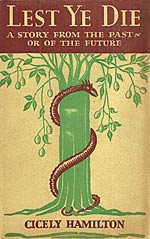
![]() Rhondak101
Rhondak101
7/4/2014
![]()
"Hamilton is one of the first — and among the darkest — of those UK novelists whose vision of things was shaped by WWI, which they saw as foretelling the end of civilization." — The Encyclopedia of Science Fiction, Clute and Nicholls, eds.
I read Cicely Hamilton's Lest Ye Die: A Story of the Past or the Future (1922; also known as Theodore Savage) in installments on the Hilobrow website. Hamilton's writing style makes it very much a novel of its time. The sentences are very long and detailed, and she takes much pleasure in telling rather than showing. However, much of that is to be expected as the demonstrates an allegory about war, community and barbarity.
Theodore Savage represents Hamilton's idea of the common man, an Oxbridge educated clerk, who is only moderately interested in politics. He is not a career man. He puts in his work hours and devotes his time and passions to furnishing "his rooms in accordance with his taste," which includes "his treasured Fragonard and his bell-toned Georgian wine-glasses" (1st installment). With the threat of aworld war coming from a fictional kingdom in the Balkans, Savage and his friend discuss human relations:
"All men hate each other naturally... You believe that?"
"Of individuals, no — but of all communities, yes... You and I are civilized, as man and man, but collectively we are part of a life whose only standard and motive is self-interest, its own advantage... a beast-life, morally" (4th installment).
Hamilton's book looks closely at these statements as a war quickly destroys all vestiges of English civilization. She details how distrust can spread between individuals when basic human needs are not met and how when needs are fulfilled and communities formed that distrust becomes a part of one's communal identity.
The method of "modern" war devalues all human life. The strategy as she describes it is: "the exhaustion of the enemy by burdening him with a starving and nomadic population. War, once a matter of armies in the field, had resolved itself into an open and thorough-going effort to ruin enemy industry by setting his people on the run; to destroy enemy agriculture not only by incendiary devices... but by the secondary and even more potent agency of starving millions driven out to forage as they could" (5th). As cities and agriculture are destroyed, the millions must keep moving to find food of any kind. The world becomes savage. However, our protagonist, Mr. Savage, fights against savagery; however, his life becomes dominated by two words only "starvation and fear" (9th installment). However, Savage's logic and knowledge enable him to reason out how to live off the land. He learns quickly and creates a solitary and isolated life with a "wife."
He did not choose this partner instead she clamped onto him and became an automatic dependent that he does not have the heart to abandon. Ada is a Cockney, who Hamilton describes as "a buxom, useless and noisy young woman — good natured, with the brain of a hen; incapable alike of boiling a potato or feeling an interest in any subject that did not concern her directly (14th installment). For Hamilton, Ada represents the urban poor, a lazy "town-bred specialist" who expects Savage to do everything for her, incapable of reasoning or planning. Savage beats her (literally) into an obedient partner, someone who can follow orders. Hamilton writes: "she was so plainly his mental inferior, so plainly amenable to the argument of force and no other, that she facilitated his conversion to the barbaric doctrine of marriage." (15th installment). Obviously, it is disturbing to see a Marxist feminist, which Hamilton was by all accounts, write these words. When we think of Ada as a representative of womankind, it is disturbing, and when we think of her representing the lower class, it is equally disturbing; therefore, Hamilton's message is humanity must do everything it can to stop regressing to such savagery and barbarity.
And how does humanity do that? According to Hamilton, by the limiting of science. We must remember that World War I, which began when Hamilton was 42, was the first scientific war, with tanks, flame throwers, and poisonous gases. When Savage and Ada decide to seek out a community, they find a ubiquitious hatred for "the devil's knowledge," which caused the Ruin: "What these outcasts, these remnants of humanity feared above all things was a revival of the science, the mechanical powers, that had wrecked their cities, their houses and their lives" (19th installment). This disavowal of knowledge and a forced forgetfulness of life before the Ruin become the foundation of a new religion.
This is a thought-provoking and disturbing book, especially when reading it in a time of such xenophobia and anti-intellectualism. It peels back the façade of civilization and shows that we, at our core, are driven solely by our needs and our fears. This book needs to be rediscovered. I'm so glad that HiLo Books has republished it. I'm going to order a physical copy and recommend it to my friends.